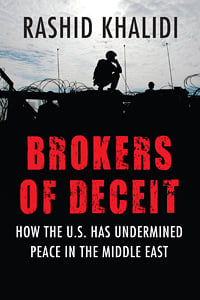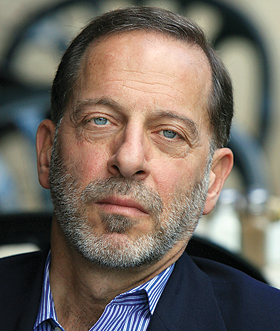Brokers of Deceit: How the U.S. Has Undermined Peace in the Middle East
Rashid Khalidi on how the United States sustains the failure of the Israel–Palestine peace process
Columbia University historian Rashid Khalidi served as a Palestinian adviser during U.S.-brokered talks over a future Palestinian state. Now he has authored Brokers of Deceit: How the U.S. Has Undermined Peace in the Middle East, a stinging attack on the role played by American representatives during the process. His book offers a perspective that Americans rarely hear: one that chronicles America’s steps and links them directly to the stagnation and failure of the entire process. I put six questions to Khalidi about his book:
1. Let’s start with a look into the future. You say that Washington’s partiality for Israel in Middle Eastern affairs has thus far cost it very little, largely because the Arab world consists of states where the opinion of the masses counts for very little — but that Washington may face a sort of democratic day of reckoning as the Arab world moves towards democratic governance. On the other hand, the consensus view in the recent Foreign Affairs special issue on the Arab Spring was that democracy was hardly yet in prospect. How far off do you think this day of reckoning is, and what form do you expect it to take?
Institutionalized functioning democracy is not yet in prospect in most of the Arab world. It may be a long way off. But I doubt that this region can permanently remain an anomaly in the world as a whole, which for decades has seen a trend toward more democratic governance, from East and South Asia to Eastern Europe and Latin America. The Middle East as a region is unusual in that because of its strategic importance it has long been subject to a high degree of external interference. It is also home to bastions of monarchical autocracy in the form of several Arab Gulf regimes, which are fighting a ferocious rearguard action against democracy.
But Arab peoples have demonstrated a profound aspiration for change in Egypt, Tunisia, and several other countries. We shall see whether that will eventually triumph, and whether Arab public opinion will finally have a say in policy-making on Palestine and other matters, or whether external meddling and the partisans of the awful Arab status quo will continue to prevail. If the latter happens, it will probably only be a matter of time until we see another series of explosions like those of the past two years. In any case, continuing to link American policy on Palestine to the persistence of this rotten and undemocratic status quo is a typically short-sighted approach.
2. Your title seems clearly designed to critique America’s claim to be an “honest broker” in the Israel–Palestine dialogue. Surely the term “broker” was used precisely because America has never denied its partiality toward Israel. What, precisely, was dishonest about the American role?
The United States claimed not only to be an honest broker between Palestinians and Israelis — Condoleezza Rice uses precisely these words in a document I quote in the book — it also claimed to be working for peace between them. Neither claim was true. The United States has been bound by a 1975 memorandum of understanding to the prior coordination of its positions on this issue with Israel, which it has faithfully done ever since then. This has been interpreted in practice to mean that Israel has effective veto power on what the United States can propose regarding the Palestine issue. And since Camp David in 1978, the United States has allowed Israel to dictate the low ceiling for what the Palestinians can aspire to. This ceiling was established by Menachem Begin in 1978, as laid out in documents I cite in the book, and that has not changed since: Israel will never accept a fully sovereign Palestinian state; it will never stop expanding its settlements or give up control of land, water, or Jerusalem. And every deal brokered by the United States since then, and indeed the status quo that emerged from the Oslo Accords and that we are living with today, is completely consonant with Begin’s schema. That is neither honest, nor for that matter brokering: It is acting as “Israel’s lawyer,” as Aaron David Miller accurately put it, quoting Henry Kissinger.
3. You lay great stress upon the posture assumed by Begin toward a Palestinian state, particularly as it was interpreted in a 1982 U.S. National Intelligence Council memo. Why?
I cite this intelligence memo (as well as the 1977 Likud electoral program, and handwritten notes by Begin at the time of Camp David that a graduate student working with me uncovered in Israel’s state archive) to show to what degree every prime minister of Israel since then has adhered to the basic outlines of the strictures on the Palestinians that Begin laid down, whether they shared his Greater Land of Israel ideology or not. This was the case even in the mid-1990’s with Yitzhak Rabin, who changed many of the parameters Begin and then Yitzhak Shamir had insisted on, by doing things they would never have done. These included negotiating directly with the PLO, recognizing that there was such a thing as a Palestinian people and that this people was represented by the PLO, and permitting the PLO and its cadres and militants to return to the occupied territories. But they were allowed to do so in order for them to serve as the police force for the autonomy scheme that Begin envisaged and Rabin brought to fruition. In this as in so many respects, Begin laid down the outlines that others have since filled in. And American policy has acquiesced in all of this, in spite of the misgivings of presidents and their advisers from Carter and Reagan down to George H. W. Bush, Clinton, and Obama.
4. Reviewing the negotiating posture of U.S. administrations over the past thirty-five years, you see little difference between them, with the exception of the administration of George W. Bush, which you characterize as a total outlier. What sets the Bush years apart?
In many respects George W. Bush was an outlier. Unlike every one of the presidents I just mentioned, he did not even try to make American policy slightly less unbalanced in its extreme bias in favor of Israel. Every one of the five before and after him at least attempted to do so. Indeed in a 2004 letter to Prime Minister Ariel Sharon, Bush took the major step of aligning U.S. policy completely with that of Israel as far as the settlements and the right of return for Palestinian refugees were concerned. This was something no previous American president had done. Bush was surrounded by some of the most pro-Israel advisers of any president since Johnson and Reagan, although it should be said that when it comes to blinkered one-sidedness, Dennis Ross and a couple of his colleagues who worked in several other administrations score pretty high.
Having said this about Bush, I should add that in other respects he was no worse than the other five: during the 1991–1993 Washington negotiations, in which I participated as an adviser to the Palestinian delegation, we experienced American bias identical to what the Bush Administration later demonstrated. In one instance in 1993, an American “bridging proposal” was less forthcoming toward the Palestinians than had been the position of the Israelis themselves. As I note in the book, something almost identical happened under George W. Bush in 2006.
5. Why did the efforts of former Senate majority leader George Mitchell to reignite Israel–Palestine talks as Obama’s special representative fail?
They failed for many reasons. The first was that the political environment in Washington, especially in Congress after the Republican midterm victories of 2010, was simply not propitious for a break with the failed policies of the previous several administrations, which were upheld by a bipartisan consensus that was policed by the Israel lobby. The second was that Obama was unfortunate in coming into office just before Netanyahu again became prime minister. This meant that Israel’s leader was once again a man as fully committed to a Greater Land of Israel ideology as had been Begin and Shamir. A third is that Mitchell’s efforts were systematically undercut and sabotaged by Dennis Ross.
Ross was and is a slick bureaucratic infighter. He is also utterly wedded to the failed “peace process” approach that — in keeping with Begin’s low ceiling on what could be offered to the Palestinians — has produced only process, but no peace. That framework is bankrupt and cannot produce peace; indeed it is not designed to. It is meant mainly to prevent friction between the United States and an expansionist Israel, and one of the things it has produced is a settler population that has ballooned from around 200,000 in 1991 to well over half a million. Facing these obstacles, Mitchell did not have much of a chance.
 6. President Obama is headed in a few days to Israel, where he will meet with Netanyahu, who has just been solidly re-elected in a race marked by a historically unprecedented alliance between Netanyahu’s Likud Party and Tea Party Republicans. This alliance included strenuous efforts to bend the race by holding out the prospect of an Israel-initiated war with Iran. What consequences, if any, do you expect this meeting to have for the U.S. posture on Israel–Palestine talks?
6. President Obama is headed in a few days to Israel, where he will meet with Netanyahu, who has just been solidly re-elected in a race marked by a historically unprecedented alliance between Netanyahu’s Likud Party and Tea Party Republicans. This alliance included strenuous efforts to bend the race by holding out the prospect of an Israel-initiated war with Iran. What consequences, if any, do you expect this meeting to have for the U.S. posture on Israel–Palestine talks?
Given the even more right-wing Israeli government that is about to be formed, given the total disarray of Palestinian politics and the state of political and social upheaval in several parts of the Arab world, given the urgency of the situation in Syria and the interminable evolution of the nuclear issue with Iran, and especially given the stranglehold of conventional thinking in Washington regarding this issue, I do not see any possibility of progress between Israel and the Palestinians. Haaretz has just reported that the new Israeli coalition government plans to bring the number of settlers in the occupied territories up to a million. Will our government do anything about this, besides indirectly helping to finance this outcome? When and if this happens, will people still keep blathering on about a “Palestinian state” and a two-state solution? In Washington they just might, in order to keep intact the Orwellian curtain behind which all the skullduggery takes place. But as I argue in my book, this whole approach that began in 1978 from a constrictive framework based on Begin’s ideas was never intended to bring about peace. It was meant to do what Begin wanted, which was to keep the occupied West Bank and East Jerusalem eternally part of Israel. It will eventually have to be replaced, but that will probably only happen when events in the Middle East force everyone to understand how much the continuation of this status quo harms the interests of the United States, and when leaders in this country become responsible and courageous enough to recognize that fact and do something about it.



